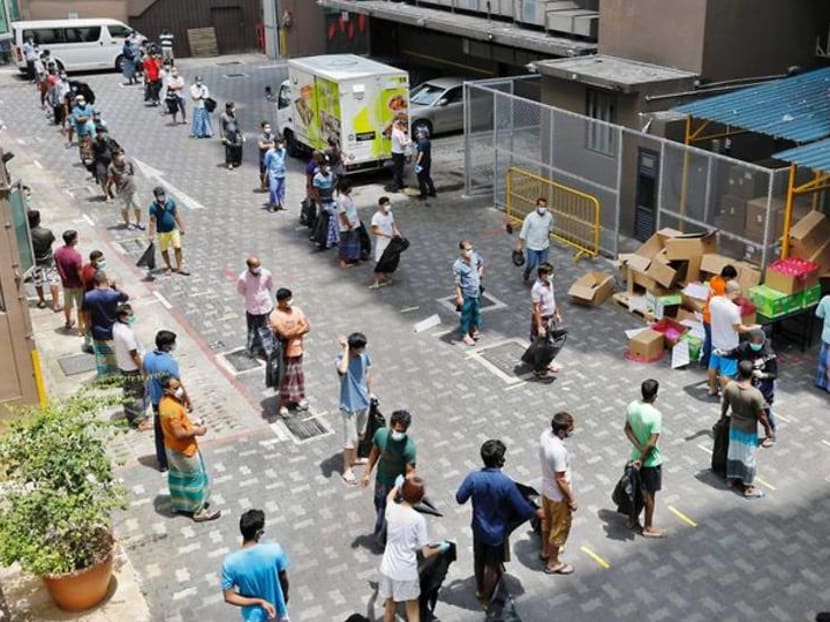Salary dispute claims fell in 2020 despite economic downturn, COVID-19 restrictions

Workers adopt safe distancing measures as they queue up for lunch at a dormitory during the COVID-19 outbreak in Singapore on Apr 10, 2020. (Photo: Ministry of Manpower/Handout via Reuters)
SINGAPORE: Despite an economic downturn, the incidence of salary claims made by workers last year declined, driven largely by a fall in claims made by foreign employees.
The total incidence of salary claims in 2020 fell to 2.15 per 1,000 employees, down from 2019’s 2.68 per 1,000 employees, according to the Employment Standards Report 2020 released on Friday (Jul 9).
The figure crept up for local workers to 1.61 per 1,000 local employees in 2020, compared to 1.53 in 2019.
This was higher in industries such as accommodation and food services activities, information and communications, and construction, some of which were severely impacted by the "circuit breaker" and movement restrictions in 2020, said the Ministry of Manpower (MOM) and the Tripartite Alliance for Dispute Management (TADM) in the report.
For foreign workers, there were 3.47 salary claims per 1,000 foreign employees, compared to 4.98 in 2019. The industries with the highest incidence of salary claims were arts, entertainment and recreation, accommodation and food services activities, as well as construction.
READ: Commentary: Were you fired or retrenched? Your employer may not tell you the difference
Disputes over basic salaries made up most of the claims but the agencies noted that the proportion of claims relating to end of employment issues, such as salary in-lieu of notice and encashment of unconsumed annual leave increased in 2020.
This was due to disagreements on whether leave had been taken during the circuit breaker and if salaries were owed during the period of business disruption.
The report said that for foreign workers, the fall in claims was mainly because authorities had taken steps to address potential disputes due to the impact of COVID-19 on businesses.
When dormitories went into lockdown around April 2020, MOM introduced a requirement for all employers with workers living in dormitories to pay salaries electronically.
From May last year, all employers in the construction sector, which traditionally accounted for a high percentage of salary non-payment cases, had to submit monthly declarations on the status of salary payment to their foreign employees.
READ: Cleaners’ wages to rise from 2023 amid COVID-19 labour crunch
In June last year, MOM introduced a module on a mobile application for migrant workers so that they can report any salary, bank account and remittance issues.
For owed salaries, TADM actively engaged employers and facilitated salary resolution for about 7,000 migrant workers between June and December 2020, without requiring employees to come forward to lodge these salary claims.
“As a result, salary issues did not feature prominently in the management of COVID-19 at the dormitories,” said the report.
Senior Minister of State for Manpower Koh Poh Koon said in a Facebook post that despite the weakened economic conditions, Singapore’s employment standards remained stable last year.
"Employers and employees had worked together and made mutual sacrifices to sustain businesses and preserve jobs," he wrote.
Mr Kandhavel Periyasamy, TADM general manager noted that the incidence of salary claims among local employees increased slightly, especially in industries more affected by the circuit breaker and movement restrictions.
"We will watch this trend closely and adapt our interventions and strategies accordingly,” he said.
MORE THAN 9 IN 10 WORKERS REPAID
For all workers, MOM had in March 2020 introduced a requirement for employers with 10 or more employees to notify the ministry of any cost-saving measures that affect employees' monthly salaries.
READ: Firms must report cost-saving measures that affect employees’ salaries: MOM
The Tripartite Alliance for Fair and Progressive Employment Practices (TAFEP) then proactively engaged employers who had made severe pay cuts to check whether the cost-saving measures were implemented fairly, the report said.
TAFEP persuaded employers to “exercise compassion in supporting their employees”, it added.
The median duration of salary arrears claimed by foreign workers also fell to 2.3 months, compared to 3.4 months in 2019. This indicates that they are reporting lapses in salary payments earlier. For local employees, the median duration was 1.1 months in 2020.
The total recovered sum to employees amounted to about S$15 million and more than nine in 10 employees (92 per cent) who filed claims fully recovered their salaries, said the report.
Of the remaining 8 per cent of employees, 5 percentage points recovered their salaries partially. Most of these claims involved employers who were unable to make full payment for their workers’ owed salaries due to financial difficulties.
READ: COVID-19 pandemic shows progressive wage model 'superior' to minimum wage: Zaqy Mohamad
MOM and TADM helped the affected workers recover part of their salary arrears through other means, such as by negotiating for settlement payments from security bond insurers or main contractors, or helping lower-wage employees get help through the Short-Term Relief Fund (STRF) or Migrant Workers’ Assistance Fund (MWAF).
“The remaining employees did not recover any salaries and were mainly higher income earners who did not qualify for financial relief through the STRF or MWAF,” the report noted.
MOM suspended the work pass privileges of all employers who did not fully repay their employees.
It added that less than 1 per cent of the salary claims lodged in 2020 involved "wilful employers" who refused to make full payment of the salary arrears despite having the means to do so. MOM said it investigates these employers with a view of prosecuting them.
MOST WRONGFUL DISMISSAL CLAIMS “UNSUBSTANTIATED”
The overall incidence of wrongful dismissal claims remained low at 0.39 claims per 1,000 employees, the agencies said.
While it spiked in the second quarter of 2020, the incidence of such claims “stabilised” in the last two quarters of 2020.
Many of the dismissal claims in the second quarter of 2020 were lodged by employees who were terminated abruptly, due in part to the restrictions in face-to-face meetings during the circuit breaker.
However, most of these employers had fulfilled their contractual obligations, said the report.
Of the wrongful dismissal claims assessed by TADM, about three-quarters (74 per cent) were found to be unsubstantiated, the report said.
READ: Negotiations on wage increases for workers in security, landscape and lift and escalator sectors to be concluded soon: Tan See Leng
“Many of these claims had arisen from disputes over work performance, poor communication between the employer and employee or business restructuring due to the lacklustre economy," it added.
For such claims, TADM will explain to the employees the lack of basis for their claims, help them seek closure to their grievances, and refer them to financial assistance programmes such as the COVID-19 Recovery Grant or job facilitation support where applicable.
For the 26 per cent of claims that were substantiated, TADM will require the employer to address the claims, such as by compensating the employee, clearing up any miscommunication and/or facilitating the employee’s job search.
Seventy per cent of wrongful dismissal claims lodged in 2020 were concluded at TADM within two months, it said, with the remaining complex claims "generally concluding" between two and six months.
ONLINE OUTREACH
Dispute resolution was mainly carried out online last year due to the pandemic, and more than 600 cases per month were handled on the Online Dispute Resolution (ODR) platform.
Parties could use email, WhatsApp Business messages, and online conferencing platforms to discuss and settle their disputes, said the report.
In the next phases of development, TADM said it will focus on enhancing the usability of the system to cater to different users' profile and improve their access to relevant material, and explore the use of artificial intelligence and scenario-based conversations to guide users in their decision-making.
More than three-quarters (76 per cent) of salary claims were resolved at TADM within two months, while complex claims were "generally concluded" between two and six months.
The cases that took longer usually required further fact-finding when parties presented conflicting accounts or evidence.
The proportion of salary claims concluded within two months decreased in 2020 partly due to the weak economic climate which made it more difficult for parties to agree on the payment terms, the report said.





